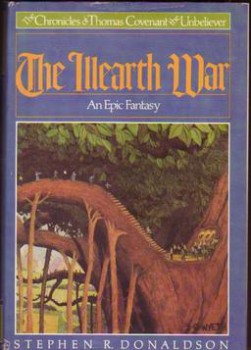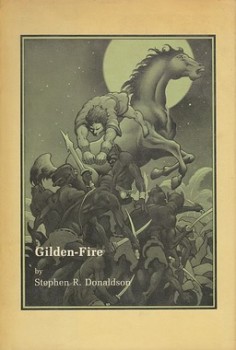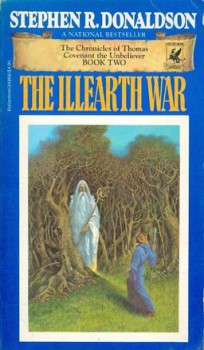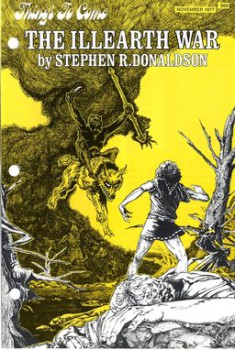Despair All The Way Down: The Illearth War by Stephen R. Donaldson
“You’re determined to make this hard, aren’t you? You’re determined to make it hard for everyone.”
Hile Troy to Thomas Covenant
If Lord Foul’s Bane (go here for my review) with its rapist leper hero is a trip into the Black Hole of Calcutta, its sequel, The Illearth War (1978) is an unremitting journey into the blackest space over the event horizon. Where the first book offered hope to its characters with the successful completion of their quest, this one holds out no hope even in victory. At the best of times there is only a stay of certain execution. Mostly, though, there is loss, deep and devastating loss.
It’s also a book that almost defeated me. For three weeks it defied my efforts to put into words what I thought was going on in it and what I thought of it. It’s not that it’s super complicated, but it’s a shadowy thing that required more work than I’m used to to understand its guts.
The Illearth War is a story steeped in existential dread. Both inaction and action in the face of soul-crushing evil seem to lead to disastrous ends. To believe or not to believe? To fight or not to fight? To kill or to be killed? Does it make any difference? This is heady stuff for fantasy and bound to put off more casual readers, but Donaldson takes on the debate with conviction and seriousness.
The dilemma is addressed primarily by contrasting Thomas Covenant’s attitude toward the Land with that of a new character from our world, Hile Troy. Covenant refuses to accept the magical Land, its healing properties, or to lift a finger to save it, while Troy fully embraces it and is completely dedicated to its survival. Each man is convinced of the rightness of his path, and both suffer calamitous losses for their convictions. Covenant scoffs at Troy for thinking he can thwart Lord Foul while Troy berates Covenant for refusing to fight. Donaldson plays these titans, inaction versus action, against each other like musical counterpoints. Each reflects off the other, exposing its opponent’s dangers and rewards. This is the heart of The Illearth War.
It’s not an argument made lightly or with straw men. Donaldson digs deeply into each man’s mind and character, exploring the complex motives and reasoning behinds their choices.
When we last left Thomas Covenant, leper, he had returned from the Land to our world, unsure of the nature of what had just happened to him. How could the Quest to recover the Staff of Law be anything other than a hallucination?
 A short time after the final events of the previous novel, Covenant finds himself summoned back to the Land by the Council of Lords. While it’s been only a few weeks in the real world, forty years have passed in the Land. Lord Foul, the Despiser has come into possession of a powerful, evil magic object, the Illearth Stone. With it, he has warped, physically and spiritually, thousands of people and animals and added them to his army of ur-viles, griffins, wolves, and Cavewights. That army is preparing to march out of Foul’s domain. Lord Foul’s earlier promise to destroy the Land in forty-nine years is getting close to becoming reality.
A short time after the final events of the previous novel, Covenant finds himself summoned back to the Land by the Council of Lords. While it’s been only a few weeks in the real world, forty years have passed in the Land. Lord Foul, the Despiser has come into possession of a powerful, evil magic object, the Illearth Stone. With it, he has warped, physically and spiritually, thousands of people and animals and added them to his army of ur-viles, griffins, wolves, and Cavewights. That army is preparing to march out of Foul’s domain. Lord Foul’s earlier promise to destroy the Land in forty-nine years is getting close to becoming reality.
The present High Lord, Elena, is convinced that only Thomas Covenant — with his white-gold wedding band, a totem of tremendous power in the Land — is capable of defeating Lord Foul. Brought before her very much against his will (he was in the middle of the first phone conversation in ages with his ex-wife), Covenant refuses to help. Still scarred by the killing he did during his first sojourn in the Land, he insists he will not lift a hand against anyone ever again. More importantly, he still believes the Land isn’t real and to admit belief in it will only destroy the discipline he needs to survive as a leper.
Nevertheless, Covenant eventually allows himself to be drawn into the war, though primarily as a Cassandra, trying to warn the Lords of the dangers of their actions.
“Don’t you see it? Foul put us right where we are. He released dukkha so that we would be right here now. He must have a reason. He likes to destroy people through the things that make them hope…”Elena, the Seventh Ward might be the worst thing that has happened yet.”
But she had her answer ready. “No, beloved. I do not believe it.”
In Lord Foul’s Bane Covenant took the gift of the Land — the healing of his leprosy — and betrayed it with his first action, raping Lena. Later, during the quest for the Staff of Law he killed several cavewights. Now, burdened by guilt, for him the only action is inaction.
“That’s sophistry.”
“Sophistry? I do not know this word.”
“Clever arguments to finance what you’ve already decided to do. Rationalization. War in the name of Peace. As if when you poke your sword into a foe you aren’t slicing up ordinary flesh and blood that has as much right to go on living as you do.”
“Then do you truly believe that there is no difference between fighting to destroy the Land and fighting to preserve it?”
“Difference? What has that got to do with it? It’s still killing….”
He also rejects the claim he is the savior of the Land. In his eyes he is a unforgivable man lacking the strength attributed to him by the Lords.
Like Covenant, Hile Troy is a traveler from our world. His existence, and that we see the Land from his perspective, would seem to render Covenant’s disbelief a settled question. How can the Land be false if we are able to see it from Troy’s perspective now, as well as Covenant’s?
Hile Troy was born without eyes and the lack of visual distractions engendered a prodigious talent for developing complex strategies, something he did for various unnamed agencies. When he fell from a window ledge escaping a fire he awoke in the Land, summoned by Atiaran, the mother of Lena, the girl raped by Covenant.
Troy is magically endowed by the Lords’ healing with an extrasensory ability to see. The gift of sight, of color and shapes, after a life of nothing, makes him fall in love with the Land. He swiftly convinces the Lords to make him their supreme military commander. By the time Covenant arrives, Troy has formulated a battle plan to face and defeat Lord Foul. It’s easy to understand why he thinks anyone, especially someone as potentially poweful as Covenant, who won’t help secure the Land’s safety is a traitor.
He paused for a moment, remembering. Then he said strongly, “I’ll tell you — I never think about going back. How can I? I’m here, and I can see. The Land’s given me a gift I could never repay in a dozen lifetimes. I’ve got too big a debt — The first time I stood on the top of Revelwood and looked over the valley where the Rill and Llurallin rivers come together — the first time, Covenant, I had ever even known such sights existed — I swore I was going to win this war for the Land.
This opposition in attitudes leads to a different construction in The Illearth War than in its predecessor. Lord Foul’s Bane was a straight up quest novel seen from only Thomas Covenant’s perspective. Not so here. Instead, for much of the novel, the passive Covenant tags along on a search for long-hidden magical knowledge. Eeyore-like, he’s a voice of gloom, endlessly warning his companions about the folly and pointlessness of their actions. His unbelief in the Land allows him to see certain events with eyes less clouded eyes than its denizens.
And that was not the only argument. This seduction of responsibility was Foul’s doing. It was the means by which Lord Foul attempted to ensure the destruction of the Land. When inadequate men assumed huge burdens, the outcome could only serve Despite. Covenant had no doubt that Troy was inadequate.
On the other hand, the hyper-zealous Hile Troy leads his army on mad forced marches and into desperate battles. He is in endless motion, giving every waking moment to figuring how to overcome Lord Foul’s armies and achieve victory. The nature of the material lends itself to scenes of action and epic confrontation.
 Wedged into Troy’s story is an odd subsection that reads more like a short story than an organic part of the book. Prior to the the book’s opening the Council of Lords has lost contact with its most powerful allies, the Giants of Seareach. An expedition is sent off to discover what has become of them. Two of its survivors tell Troy what happened. We don’t see it as it happened, or even in its tellers’ own words. It’s very well done, pulpish in its exuberant use of gore and magic, but it feels odd and slighlty disruptive of the novel’s flow. Even Donaldson must have felt this, as he excised the first part of it and issued it as an actual separate short story called “Gilden-Fire.”
Wedged into Troy’s story is an odd subsection that reads more like a short story than an organic part of the book. Prior to the the book’s opening the Council of Lords has lost contact with its most powerful allies, the Giants of Seareach. An expedition is sent off to discover what has become of them. Two of its survivors tell Troy what happened. We don’t see it as it happened, or even in its tellers’ own words. It’s very well done, pulpish in its exuberant use of gore and magic, but it feels odd and slighlty disruptive of the novel’s flow. Even Donaldson must have felt this, as he excised the first part of it and issued it as an actual separate short story called “Gilden-Fire.”
This book possesses all the same strengths as the previous one. Donaldson may have eschewed the easy trappings of genre fantasy, but he still delivers moments of wonderful world-building and exciting storytelling. The great keep Revelstone, the tree city Revelwood, and the Giant’s city of Coercri, are all vividly wrought. The evil swamp, Lifeswallower, is a masterpiece of vegatative corruption.
Numerous instances of bravery and heroics are scattered through the book. It’s been claimed these books are talky, and at times they are, but the dialogue is well done. What’s not often mentioned is that Donaldson is also a great writer of action and adventure. Despite feeling a little out of place, the tale of the mission to the Giants is a perfect blend of adventure and horror. The battles of the armies under Hile Troy are pulse-pounding:
The Giant striding at its head was the least of its horrors. At the Giant’s back marched immense ranks of Cavewights — at least twenty thousand of the strong, ungainly rock delvers. Behind them hurried an equal number of ur-viles, loping on all fours for better speed. Through their ranks, hundreds of fearsome, lion-like griffins alternately trotted and flew. And after the Demondim-spawn came a seething, grim army so huge that Troy could not even guess its numbers: humans, wolves, Waynhim, forest animals, creatures of the Flat, all radiating the fathomless blood-hunger which coerced them — many myriad of warped, rabid creatures, the perverted handiwork of Lord Foul and the Illearth Stone.
 The same flaws are present as well. There’s the tendency to prolixity and portentousness. While control of his metaphors has improved here, there are still some head-scratching ones. But these flaws are minor. In fact, they are really strengths. Donaldson’s prose is unique, reading nothing like the flat style found in much mass-produced fantasy. You will not mistake it for anyone else’s.
The same flaws are present as well. There’s the tendency to prolixity and portentousness. While control of his metaphors has improved here, there are still some head-scratching ones. But these flaws are minor. In fact, they are really strengths. Donaldson’s prose is unique, reading nothing like the flat style found in much mass-produced fantasy. You will not mistake it for anyone else’s.
As the middle book in a trilogy (itself only the first of three distinct sequences about Covenant), The Illearth War is a setup for the next book, The Power That Preserves. By setting it so long after the events of Lord Foul’s Bane, though, and bringing it to a very definite conclusion, it doesn’t suffer very much from middle book syndrome. While obviously part of a larger story, it stands pretty firmly on its own.
There’s so much I’m leaving out that you’ll have to discover on your own. The High Lord Elena, child of Covenant’s great crime, and her quest for the Seventh Ward is a study in self-delusion and self-destruction. The ravers, Lord Foul’s terrible lieutenants, and the Forestal of Garrotting Deep read like they stepped out of the darkest fairytales. The deathless Blood Guard finally get their time in the sun and we get to see how really powerful they are, in and out of battle. And so, so much more.
The Illearth War is considered a classic and I agree. Thomas Covenant does make it hard for his companions and hard for the reader. But he is also gifted by his creator with a bitter, raw humanity that is gripping. I still don’t know where he will come down in the fight against Lord Foul. I don’t know if he will take up the cause (though, admittedly, the existence of eight more books sort of hints at which way he’ll go) and be the hero everyone is telling him he is. It never feels like Donaldson is stringing his readers along, but rather creating as honest and believable a character as possible, crushed by guilt and fear.
As a work of fantasy fiction, it is one of particular creativity that uses none of the tired elements of knights, wizards, and princesses in distress. I like my fantasy fantastic, not simply the Middle Ages with a little bit of extra cynicism, magic, and maybe some elves stirred into the pot. With Covenant, the Land and its denizens, and the tales of its time of trial, Donaldson did something rarely done in mass market fantasy: he created something original. I planned to cycle back to Fionavar, and the Riddle-Master books before getting around to the final book in this trilogy but I won’t be. Next week: The Power That Preserves.
Fletcher Vredenburgh reviews here at Black Gate most Tuesday mornings and at his own site, Swords & Sorcery: A Blog when his muse hits him. You can read his thoughts about epic high fantasy here.

I never thought I’d want to return to the Thomas Covenant books, but you’re moving me to reconsider.
I read them too young, when I was maybe 13. My neighborhood was, at the time, besieged by a serial child rapist who had been at large for two years and wouldn’t be caught until a year later. You know the response so many readers have had to Thomas Covenant’s rape of Lena — my version of that response was memorably intense. In retrospect, the remarkable thing is that I kept reading the first book at all, even as angry as it made me. I slogged through the whole first trilogy. These were the first books that ever made me angry enough to throw them at the wall, and they made me that angry several times a volume.
As much as anything else, it drove me mad that I couldn’t figure out what Donaldson was doing right. Why couldn’t I stop reading? Whatever the virtue was, it must have been a powerful one. Maybe it’s time to go back and find out.
Sarah – That’s horrible. If you do reread them I’d love to know what you think.
I tried to read them at around the same age as you – I didn’t make it much past the first couple of chapters. It was too dense and Covenant too repugnant to slog on.
Funny thing though,I didn’t have a problem with the genocidal Elric or the evil bastard Kane. I’m curious how many readers won’t pick these up because of the rape of Lena but have no problem with GRRM or similar writers.
Reading them now, I’m struck by the same questions you were. The books are still tough reads, but they’re mesmerizing.
I’ve read the first 2 trilogies three times, and now I want revisit the Land again. Wonderfully insightful review, Fletcher. You encapsulate everything I enjoyed about the books: they’re DIFFERENT. In spite of being obviously influenced by Tolkien, this is a an altogether different breed of heroic fantasy, and for me, it will always remain brilliant work in the genre.
It was with the Illearth War that I first felt that I was beginning to see what Donaldson was really up to. Where Covenant shows the dangers of stubborn disbelief, Hile Troy illustrates the pitfalls of reckless commitment. Troy’s story was truly tragic.
I remember reading these fondly oh-so-long ago. Despite starting out rather Tokienesque, Donaldson did end up with something unique, not only because of the strange protagonist, but because of the very dread you speak of. In this final book, it resides in the pages like some foul plague that inflicts the reader. But, you know, in a good way.
Apologies, I said final book when referring to the Illearth War. I meant the second.
I think the best thing about the original trilogy was the three hardcover covers. I forced my way through, always hoping for some relief from the grim, angry characters and world, to no avail. But those covers were great.
The heart of Donaldson’s genius is that he takes the Epic Fantasy genre and applies the reality of a Flawed Humanity to it. His heroes are just as likely to die or fail as to conquer…his magic is just as likely to consume you as it is to aid you…his characters fall prey to their own weaknesses of character and the lust for power.
Donaldson uses the tropes of fantasy to explore the Human Condition. This is literary work of the highest degree…genre be damned. Fantasy Literature with an emphasis on the Literature, yet with no shortage of adventure. The icing on the cake is how he manages to evoke such raw humanity in such fantastic situations and settings. It is a goal that all good fantasy writers should ideally strive to achieve.
In a very real way, Donaldson’s humanizing of Tolkien’s basic themes set the tone for the gritty, realism-drenched fantasies of today.
@Joe B – thanks for the kind words – I don’t think these books have the popularity they once did and it’s disappointing.
@Thomas Parker – Exactly! Hile Troy might be one of the greatest tragic characters in fantasy.
@Robert – yeah, in a good way, indeed!
@RK Robinson – those covers are gorgeous – the artist doesn’t seem to have done any other genre work, which is a shame
@John Fultz – I agree he set the stage for much of what came later, but it’s a rare author that matches the artistry and depth of these books.
Fletcher, your guesses about which books I also haven’t picked up are right, but it’s not a case of Donaldson-by-association.
I never picked up Elric because the word I most often heard and read associated with those novels was “sociopath.” After having to deal with an actual sociopath in real life, I’m not a reader who can find a sociopathic main character entertaining. A sociopathic antagonist or secondary character, that I can work with. I can read GRRM because, although terrible things happen to characters in every chapter, he never wants me to root for the sociopaths, or to “make me think” by trying to manipulate me into rooting for the sociopaths. When he sends a character down a path that might lead to sociopathy, it’s clear that he sees that as tragic, and expects the reader to see it as tragic, too. But a sociopathic viewpoint character or valorized figure is a dealbreaker for me.
To my chagrin, I’d never heard of Kane until I started reading Black Gate. So far, I’ve only read one of KEW’s Kane stories. I can see what’s brilliant about it, but it didn’t make me want to read more about Kane.
Now that’s a term to describe Elric that I’ve never seen used before. He’s a bit moody and closed off, but not in any way that sets him apart from any other cool quiet fantasy hero.
Not that I am a fan of the stories, but that seems a rather odd description.
@Sarah – Like Martin, I wouldn’t call Elric a sociopath. He really is the moody, Romantic anti-hero. It’s just that he engineers the destruction of his own nation and its people and his sword feeds on the souls of his opponents (and occasionally a friend).
I’ll have to give GRRM another chance. I was put off by many things in GoT, and didn’t reach a point where I got any sense of tragedy, only the sociopathy.
The first 3 Covenant books are still the most realistic portrayal of a portal fantasy protagonist, someone thrust into a stereotypical hero-quest who quite understandably buckles under the unbelievable wish-fulfillment of it all. Donaldson never apologizes for Covenant but he also never offers facile forgiveness. Every step of the journey is painful and earned.
And I have never seen an author in sf or fantasy who so thoroughly desecrates his creation as Donaldson does in The Wounded Land. It truly is awful in both original (awe-full) and modern sense.
[…] Slime Watch (Black Gate) Despair All The Way Down: The Illearth War by Stephen R. Donaldson — “The Illearth War is a story steeped in existential dread. Both inaction and action […]